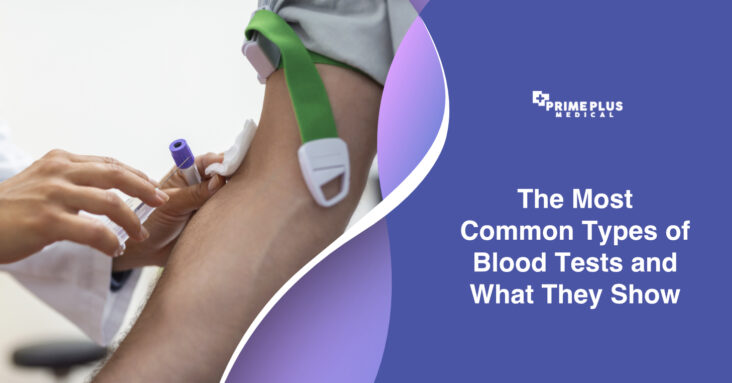The Most Common Types of Blood Tests and What They Show. Your first months, or even years, of living in Bali can indeed make you feel like you are on an endless summer holiday. Here at Prime Plus Medical in Canggu, we have certainly seen that! However, do not let that holiday mode get in the way of taking proper care of your health. In what ways, you wonder? Well, for instance, when was the last time you went for a routine blood test?
Remember that getting tested at routine intervals allows you to understand how your body might change over time. It is essential as it enables you to make informed decisions about your health.
In this article, we would like to focus on the types of blood tests, how they work, and what each blood test shows. And before we get into all that, we will start by providing you with a better understanding of the blood test itself.
What is a Blood Test?
A blood test, also known as blood work, is a medical procedure that involves collecting a blood sample from a person for diagnostic, screening, or monitoring purposes.
Blood tests are crucial in helping a doctor diagnose and monitor various medical conditions. They also help in early detection and intervention, leading to more effective management of health conditions. There are several types of blood tests, each focusing on specific aspects of the blood.
read more article Urine Test Procedure: What It Is and When You Need It
What are the Most Common Blood Tests, and What Do They Show?
The most common blood tests include:
- Complete blood count (CBC)
This test evaluates different components, including red blood cells, white blood cells, platelets, hemoglobin, and hematocrit. The complete blood count test helps a healthcare practitioner evaluate a patient’s overall health and detect health conditions, such as infections, blood disorders, blood cancer, immune system disorders, anemia, and clotting problems.
- Blood Chemistry Panel
This test, also known as a comprehensive metabolic panel (CMP), assesses various substances in the blood, including glucose, cholesterol, calcium, sodium, potassium, bicarbonate, blood urea nitrogen, chloride, creatinine, blood electrolytes, kidney, and liver enzymes.
It provides insights into organ functions and aids in diagnosing conditions like diabetes, liver disorders, kidney disease, and hormonal imbalances. It also helps evaluate and monitor medication effectiveness.
- Lipid Panel
The lipid panel or lipid profile, also known as the complete cholesterol test, is a comprehensive blood test that evaluates various lipid levels in the body, including cholesterol and triglycerides.
This test indicates the overall amount of cholesterol in the blood, including both low-density lipoprotein (LDL) cholesterol (often referred to as bad cholesterol) and high-density lipoprotein (HDL) cholesterol (often referred to as good cholesterol).
The test result provides information about a patient’s cardiovascular health and enables a healthcare professional to assess their potential risks for heart disease.
- Thyroid Panel
A thyroid panel, also known as a thyroid blood test, is used to evaluate the functioning of your thyroid gland. It measures the level of thyroid hormones in your blood, including thyroid hormones (such as T3 and T4) and thyroid-stimulating hormone (TSH).
The results of a thyroid panel can help diagnose thyroid disorders, such as hypothyroidism or hyperthyroidism. It also helps monitor whether a patient’s thyroid treatment is working effectively.
- Sexually transmitted infection (STI) tests
There are sexually transmitted infections that can be detected through a blood test. The STI blood tests typically screen infections, such as chlamydia, gonorrhea, HIV, syphilis, and hepatitis B and C. To get more accurate results, the STI blood tests are often combined with urine or swab samples. These tests are essential for early diagnosis, treatment, and prevention of the spread of STIs.
So, how long has it been since your (relevant) blood tests? If you are in Bali, please know that our team of experienced lab scientists and pathologists at Prime Plus Medical Laboratory are ready to provide you with a wide range of diagnostic tests with quick results, 24/7. Take good care of yourself!

